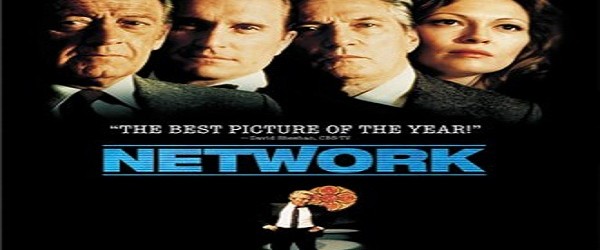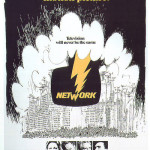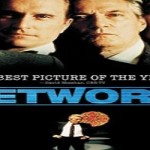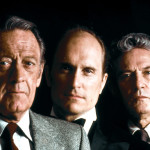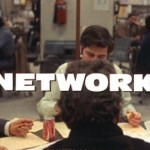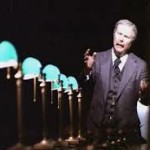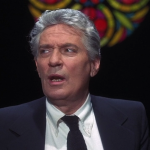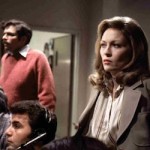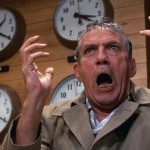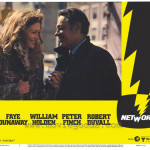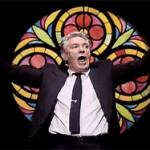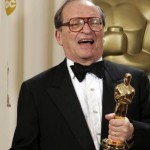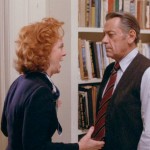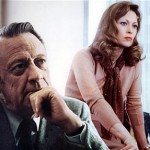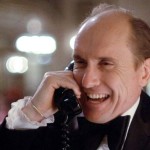“This was the story of Howard Beale, the first known instance of a man who was killed because he had lousy ratings.”
It was 1976, the year I did my O-levels, made my amateur stage debut and enjoyed some sparkling cricket and speedway in the most glorious summer in decades. Director Sidney Lumet and writer Paddy Chayefsky, on the other hand, were engaged in finishing Network, a towering satire about the role of broadcast media and mega-corporations play in the lives of Americans.
Thing is, they could have made it in 2015 and it would have had the same stamp of authenticity, such is the incredibly prophetic nature of this movie. For this reason among many, I choose to classify this as a true classic of the modern era and a film worthy to join my top 20 greatest films – and you don’t say that every day.
The movie won four Oscars, though it could easily have won a sackful. Best picture in 1977 went to the popularist Rocky, but in my view this beats Rocky hands down. The saddest part is that Peter Finch won his Best Actor Oscar for the role of “crazed” anchorman Howard Beale posthumously, having died of a heart attack that year at the age of 60. Had it gone to William Holden (who was also nominated) instead you couldn’t have argued – both were great.
Faye Dunaway scored Best Actress for her sparky programming chief, while Beatrice Straight achieved the distinction of winning the Best Supporting Actress on the strength of less than 6 minutes on screen, the shortest ever garlanded supporting performance. And that’s even without the likes of Ned Beatty, Robert Duvall, William Prince and Wesley Addy, all of whom make significant contributions.
But the most deserved Oscar, his third and last, went to Chayefsky. His script is monumental, eloquent, poetic, eminently quotable (see below this review) – none words I use lightly. The rants of several characters are almost worthy of being called soliloquies, such is their force of expression. This is the a benchmark against which to judge all screenwriters and to which all others aspire, but even the best can’t do it without actors who can deliver the lines with force and skill, and here he got them in spades – a point I will return to shortly. And of course it took Lumet to orchestrate the players and script, and he did so with barely a bum note anywhere.
The result is both powerful and memorable – there are scenes here indelibly printed on my mind, and will stay there for good! This, from Wikipedia, adds useful context to the origins of the movie:
Part of the inspiration for Chayefsky’s script came from the on-air suicide of television news reporter Christine Chubbuck in Sarasota, Florida two years earlier. The anchorwoman was suffering from depression and battles with her editors, and unable to keep going, she shot herself on camera as stunned viewers watched on July 15, 1974. Chayefsky used the incident to set up his film’s focal point. As he would say later in an interview, “Television will do anything for a rating… anything!”
The character of network executive Diana Christiansen was based on NBC daytime television programming executive Lin Bolen, which Bolen disputed.
Chayefsky and producer Howard Gottfried had just come off a lawsuit against United Artists, challenging the studio’s right to lease their previous film, The Hospital, to ABC in a package with a less successful film. Despite this recent lawsuit, Chayefsky and Gottfried signed a deal with UA to finance Network, until UA found the subject matter too controversial and backed out.
Undeterred, Chayefsky and Gottfried shopped the script around to other studios, and eventually found an interested party in MGM. Soon afterward, UA reversed itself and looked to co-finance the film with MGM, which for the past several years had distributed through UA in the US. MGM agreed to let UA back on board, and gave it the international distribution rights, with MGM controlling North American/Caribbean rights.
In short, Chayefsky was seen by these companies as biting the hand that fed him, but for the lure of dollars they simply couldn’t resist, thus demonstrating the veracity of the writer’s words.
Howard Beale (Finch) is the anchorman for the news on a fictional network, UBS, which company has recently been taken over by the Communications Corporation of America (CCA), which in turn is threatened with takeover by a Saudi Arabian conglomerate. Beale learns from veteran newsman Max Schumacher (Holden) that he is being given two weeks’ notice.
He marks this news by declaring live on air that he will blow his brains out. Schumacher allows him one more broadcast but wants to keep Beale off-screen and get him psychiatric care, but perky VP of programming Diana Christensen (Dunaway) persuades CCA’s hatchet man Frank Hackett (Duvall) to keep him on air in his own show for one reason alone – since he has ranted and threatened suicide on air, Beale’s ratings have shot through the roof.
Beale uses this time to sermonise in the style of a hell-and-damnation preacher about the evils of TV broadcasting and corporates like CCA, yet even more about the proposed takeover of CCA. He is a loose cannon, likely to mobilise public opinion against the moves wanted by the CCA board, yet after being forced to tone down his act he loses ratings. To a broadcaster, it is the far lesser sin to be an embarrassment than to get low ratings, so Beale’s death warrant is signed – he is executed live on air after a deal is struck with the counterculture terrorist group Christensen has been courting.
Finch is undeniably terrific. It would be so easy to overact the role and play the swivel-eyed loon, but despite the extraordinary fervour he generates in the rants, his Beale is compelling to watch. In the quieter off-screen moments, the intensity of this performance reminds me of Richard Burton in Equus. His madness is as enigmatic as that of Hamlet, such that you can read clear parallels in the fatalism in the dilemma of both characters. But where the Dane bows out on the cusp of revenge, Beale’s death on live TV will live forever – a guaranteed and ironic afterlife. Unlike Burton, Finch won his Oscar – albeit too late to bask in the glory.
By contrast, Holden’s Schumacher is a phlegmatic, brooding presence, at least when he is not playing the clown with his troops. At the point where he tells his wife he is leaving her for the much younger Christiansen, he stands, silent and motionless and allows her to talk herself out (speech below) before holding her close. He is old school, he does not like the corporate politics, but when the previous UBS top dog goes, there is nobody left to protect his sort from the corporate shark that is Hackett.
Talking of contrasts, Duvall’s role here is in stark contrast to his consiglieri in The Godfather movies. Hackett is fiendishly ambitious and impatient, almost desperate in his desire to sweep away the old and bring in the new. Bottom line is all that matters to him in his pursuit of the role held by his mentor, Arthur Jensen (the terrific Ned Beatty, whose monologue is repeated below), but even then he is talked round by Christiansen to try her ideas to win ratings.
She is bubbly and irrepressible, fizzing with new ideas and driven by ratings, which makes you certain from the start that her liaison with the increasingly morbid and negative Schumacher, mourning the death of integrity and independence for the news room, is doomed to failure. They are creatures from different eras, each clinging to the wreckage for different reasons.
Billed as a satire, Network can be read at so many levels – at face value and as a metaphor for the real world. Some say Chayefsky made media barons like Rupert Murdoch possible, but at the very least his was a poignant and prescient voyage into the future of broadcasting and the predilections of audiences, but also of the distorted mirror that television has become. I leave you with the words of Roger Ebert:
In a review of the film written after it received its Academy Awards, Roger Ebert called it a “supremely well-acted, intelligent film that tries for too much, that attacks not only television but also most of the other ills of the 1970s,” though “what it does accomplish is done so well, is seen so sharply, is presented so unforgivingly, that Network will outlive a lot of tidier movies.”
***
Quotes from Paddy Chayefsky’s script for Network (see more here):
Howard Beale: “I don’t have to tell you things are bad. Everybody knows things are bad. It’s a depression. Everybody’s out of work or scared of losing their job. The dollar buys a nickel’s worth, banks are going bust, shopkeepers keep a gun under the counter. Punks are running wild in the street and there’s nobody anywhere who seems to know what to do, and there’s no end to it. We know the air is unfit to breathe and our food is unfit to eat, and we sit watching our TV’s while some local newscaster tells us that today we had fifteen homicides and sixty-three violent crimes, as if that’s the way it’s supposed to be. We know things are bad – worse than bad. They’re crazy. It’s like everything everywhere is going crazy, so we don’t go out anymore. We sit in the house, and slowly the world we are living in is getting smaller, and all we say is, ‘Please, at least leave us alone in our living rooms. Let me have my toaster and my TV and my steel-belted radials and I won’t say anything. Just leave us alone.’ Well, I’m not gonna leave you alone. I want you to get mad! I don’t want you to protest. I don’t want you to riot – I don’t want you to write to your congressman because I wouldn’t know what to tell you to write. I don’t know what to do about the depression and the inflation and the Russians and the crime in the street. All I know is that first you’ve got to get mad. You’ve got to say, ‘I’m a HUMAN BEING, God damn it! My life has VALUE!’ So I want you to get up now. I want all of you to get up out of your chairs. I want you to get up right now and go to the window. Open it, and stick your head out, and yell, ‘I’M AS MAD AS HELL, AND I’M NOT GOING TO TAKE THIS ANYMORE!’ I want you to get up right now, sit up, go to your windows, open them and stick your head out and yell – ‘I’m as mad as hell and I’m not going to take this anymore!’ Things have got to change. But first, you’ve gotta get mad!… You’ve got to say, ‘I’m as mad as hell, and I’m not going to take this anymore!’ Then we’ll figure out what to do about the depression and the inflation and the oil crisis. But first get up out of your chairs, open the window, stick your head out, and yell, and say it: “I’M AS MAD AS HELL, AND I’M NOT GOING TO TAKE THIS ANYMORE!””
Arthur Jensen: “You have meddled with the primal forces of nature, Mr. Beale, and I won’t have it! Is that clear? You think you’ve merely stopped a business deal. That is not the case! The Arabs have taken billions of dollars out of this country, and now they must put it back! It is ebb and flow, tidal gravity! It is ecological balance! You are an old man who thinks in terms of nations and peoples. There are no nations. There are no peoples. There are no Russians. There are no Arabs. There are no third worlds. There is no West. There is only one holistic system of systems, one vast and immane, interwoven, interacting, multivariate, multinational dominion of dollars. Petro-dollars, electro-dollars, multi-dollars, reichmarks, rins, rubles, pounds, and shekels. It is the international system of currency which determines the totality of life on this planet. That is the natural order of things today. That is the atomic and subatomic and galactic structure of things today! And YOU have meddled with the primal forces of nature, and YOU… WILL… ATONE! Am I getting through to you, Mr. Beale? You get up on your little twenty-one inch screen and howl about America and democracy. There is no America. There is no democracy. There is only IBM, and ITT, and AT&T, and DuPont, Dow, Union Carbide, and Exxon. Those are the nations of the world today. What do you think the Russians talk about in their councils of state, Karl Marx? They get out their linear programming charts, statistical decision theories, minimax solutions, and compute the price-cost probabilities of their transactions and investments, just like we do. We no longer live in a world of nations and ideologies, Mr. Beale. The world is a college of corporations, inexorably determined by the immutable bylaws of business. The world is a business, Mr. Beale. It has been since man crawled out of the slime. And our children will live, Mr. Beale, to see that… perfect world… in which there’s no war or famine, oppression or brutality. One vast and ecumenical holding company, for whom all men will work to serve a common profit, in which all men will hold a share of stock. All necessities provided, all anxieties tranquilized, all boredom amused. And I have chosen you, Mr. Beale, to preach this evangel.”
Louise Schumacher: Then get out, go anywhere you want, go to a hotel, go live with her, and don’t come back. Because, after 25 years of building a home and raising a family and all the senseless pain that we have inflicted on each other, I’m damned if I’m going to stand here and have you tell me you’re in love with somebody else. Because this isn’t a convention weekend with your secretary, is it? Or – or some broad that you picked up after three belts of booze. This is your great winter romance, isn’t it? Your last roar of passion before you settle into your emeritus years. Is that what’s left for me? Is that my share? She gets the winter passion, and I get the dotage? What am I supposed to do? Am I supposed to sit at home knitting and purling while you slink back like some penitent drunk? I’m your wife, damn it. And, if you can’t work up a winter passion for me, the least I require is respect and allegiance. I hurt. Don’t you understand that? I hurt badly.

